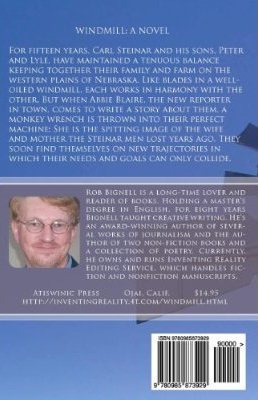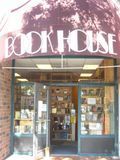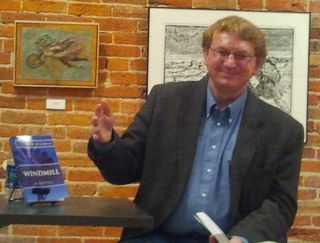Rob Bignell's Blog, page 386
December 13, 2012
Design a back cover that sells your book
While  the front cover may catch a potential reader’s attention, it hardly guarantees a sell. If the reader is interested, she’ll probably turn the book over and read the back cover.
the front cover may catch a potential reader’s attention, it hardly guarantees a sell. If the reader is interested, she’ll probably turn the book over and read the back cover.
Your goal now: Get them to realize via some fantastic back cover salesmanship that this is a book they can’t pass up.
Almost certainly the focus of your attention ought to be on the blurb. This typically is a quick synopsis of the book, like an advertisement for an upcoming television program. It doesn’t give away the book’s ending but typically tells about the story’s major conflicts. Usually it appears at the top of the back cover. The blurb is so important, that we’ll dedicate a future entry to this.
A bit less important is the author’s bio. In two or three sentences you want to tell a little about yourself, focusing on why you’re qualified to write this book, especially if you’ve penned a nonfiction tome. It usually appears near the bottom of the back cover. A picture of the author often accompanies the bio. Many mainstream publishers leave off the pic as superfluous or an added expense, but since you’re self-publishing, why not indulge yourself? Indeed, many readers have a positive response to such photos (as in, “Wow, he’s important enough to have his picture on the cover!”).
If you have a website or a blog that promotes the book or you as an author, be sure to include that as well. There’s no reason to include the http:// portion of the web address, though; just start with the www (The exception is if there's no www. in the address). This also can boost the credibility of your authorship.
If you’ve created your own publishing company, include its name on the back cover as well. Adding the city where the company is located also is a nice touch. Doing so helps dismiss the impression that your book is self-published, which for some people – though that number is a minority – causes you to lose credibility.
Whatever you do, do not forget the price. While this may not seem like a big deal if using print on demand, sometimes your books will be carried by local booksellers, especially if you are doing a book reading there. Potential buyers of your book will want to know how much they need to pay, often a factor in their decision of which of two books to buy.
Almost no reader cares about the barcode or ISBN, but you’ll need both of them on the back cover if you plan to distribute your book. An ISBN is required by law on books you sell, and with the barcode is used by your distributor to track the book from printer to warehouse to shipping route to sale online or brick and mortar store. Tuck these two items at the bottom of the back cover where they won’t distract a potential buyer (Indeed, many self-publishing companies require that it appear in the back cover’s lower right corner).
Need an editor? Having your book, business document or academic paper proofread or edited before submitting it can prove invaluable. In an economic climate where you face heavy competition, your writing needs a second eye to give you the edge. I can provide that second eye.
December 12, 2012
Get it right: Its vs. it’s
It’s easy to get it’s vs. its right – and your readers will appreciate its correct usage.
“It’s” is a contraction for “it is”, as in It’s just like the one my father wore. (“It is just like the one my father wore.”)
“Its” is the possessive form of “it”, as in The sun shined high overhead, its brightness warming his face.
Need an editor? Having your book, business document or academic paper proofread or edited before submitting it can prove invaluable. In an economic climate where you face heavy competition, your writing needs a second eye to give you the edge. I can provide that second eye.
December 11, 2012
Improve writing's texture by avoiding repetition
One of the quickest ways to ruin a story’s texture is to repeat the same word between sentences and paragraphs. For example:
Koorana quivered as Birray’s scent grew stronger than ever before, so strong that the teenager thought it entwined with her very blood. For a teenage male with such wide shoulders he possessed the sweetest smile, she mused, and so tall, too. He motioned to look up, and Koorana realized everyone else in the tent was standing. She broke her stare, quickly stood. Averting her eyes to the dirt ground beneath them, Koorana vowed to concentrate on the service, but a moment later she allowed herself one last look at Birray. He was still staring at her and winked. The teenager turned back, happy, and even in the dim light could see the flowers adorning the altar.
Notice how some words, particularly “teenager” and its variant “teenage” are repeated? The paragraph could be improved by eliminating two of the three uses of that word, perhaps by replacing the first “teenager” with a synonym such as “adolescent” and simply using the pronoun “she” for “The teenager” in the last sentence.
Gustave Flaubert recommended never using a word more than once on a single page, but I consider that a bit extreme. After all, sometimes repeating the word is necessary for rhetorical effect. Consider this passage:
“Do you realize how complex living things are?” the gobena said from the revival’s dais. The crowd’s eyes clung to him despite the heat exacerbated by the tent walls’ dark hadrosaur hide. “Do you realize how complex a family is, with all of its interactions and behaviors? But some say life is no more difficult to make than the simple whistles of an ugly scrubfowl.”
The audience laughed. “How could organs as complicated as the eye or the ear or the brain of even a tiny bird ever come about by chance or natural processes?” the gobena continued. “How could a family?”
The gobena’s speech harkens to that of a revivalist and thus seems more real when the phrases “Do you realize how complex” and “How could” are repeated.
Another acceptable practice for repetition is when using an invisible word, like “the”, “and” or “said”. In the preceding passage, “the” was used 11 times, though you probably didn’t notice it.
Beyond these instances, however, avoiding repetition of words is advisable.
Need an editor? Having your book, business document or academic paper proofread or edited before submitting it can prove invaluable. In an economic climate where you face heavy competition, your writing needs a second eye to give you the edge. I can provide that second eye.
December 10, 2012
'Windmill' book reading set in Minneapolis
I’ll be  reading from and signing my novel Windmill at Book House in Dinkytown in Minneapolis on Saturday, Dec. 15, from 2 to 3:30 p.m. The book reading/signing is hosted by Book House in Dinkytown. The long-time bookstore, located at 429 14th Ave. SE, boasts more than 120,000 titles for sale. Windmill tells the story of Carl Steinar and his sons, Peter and Lyle, who for 15 years have maintained a tenuous balance to keep together their family and farm on Nebraska’s western plains. Like blades of a well-oiled windmill, each works in harmony with the other. But when Abbie Blaire, the new reporter in town comes to write a story about them, a monkey wrench is thrown into their perfect machine: She is the spitting image of the wife and mother the Steinar men lost years ago. They soon find themselves on new trajectories in which their needs and ambitions can only collide. I’ll read about a dozen pages from the collection. Books available for signing will on sale at the Book House in Dinkytown.
reading from and signing my novel Windmill at Book House in Dinkytown in Minneapolis on Saturday, Dec. 15, from 2 to 3:30 p.m. The book reading/signing is hosted by Book House in Dinkytown. The long-time bookstore, located at 429 14th Ave. SE, boasts more than 120,000 titles for sale. Windmill tells the story of Carl Steinar and his sons, Peter and Lyle, who for 15 years have maintained a tenuous balance to keep together their family and farm on Nebraska’s western plains. Like blades of a well-oiled windmill, each works in harmony with the other. But when Abbie Blaire, the new reporter in town comes to write a story about them, a monkey wrench is thrown into their perfect machine: She is the spitting image of the wife and mother the Steinar men lost years ago. They soon find themselves on new trajectories in which their needs and ambitions can only collide. I’ll read about a dozen pages from the collection. Books available for signing will on sale at the Book House in Dinkytown.
Need an editor? Having your book, business document or academic paper proofread or edited before submitting it can prove invaluable. In an economic climate where you face heavy competition, your writing needs a second eye to give you the edge. I can provide that second eye.
December 9, 2012
‘Windmill’ book reading Thursday in Menomonie
I’ll be 
reading from and signing my novel Windmill at Bookends on Main in downtown Menomonie on Thursday, Dec. 13, from 4:30 to 6:30 p.m. The book reading/signing is hosted by Bookends on Main, an independent bookseller located at 214 East Main St. The reading coincides with downtown Menomonie’s Winterdaze celebration, which includes caroling, a visit from Santa, parade and fireworks afterward.
Windmill tells the story of Carl Steinar and his sons, Peter and Lyle, who for 15 years have maintained a tenuous balance to keep together their family and farm on Nebraska’s western plains. Like blades of a well-oiled windmill, each works in harmony with the other. But when Abbie Blaire, the new reporter in town comes to write a story about them, a monkey wrench is thrown into their perfect machine: She is the spitting image of the wife and mother the Steinar men lost years ago. They soon find themselves on new trajectories in which their needs and goals can only collide.
I’ll read about a dozen pages from the collection. Books available for signing are on sale at Bookends on Main.
Need an editor? Having your book, business document or academic paper proofread or edited before submitting it can prove invaluable. In an economic climate where you face heavy competition, your writing needs a second eye to give you the edge. I can provide that second eye.
Related articles
 Editor's book featured in Wis. holiday catalog
Editor's book featured in Wis. holiday catalog WPR interviews editor about his latest novel
WPR interviews editor about his latest novel Editor reading his new novel in Eau Claire
Editor reading his new novel in Eau Claire Get a 'look inside' author's debut novel 'Windmill'
Get a 'look inside' author's debut novel 'Windmill' 'Windmill' book reading set in Minneapolis
'Windmill' book reading set in Minneapolis
December 8, 2012
Five great quotations about novel writing
“There are three rules for writing the novel. Unfortunately, no one knows what they are.” – W. Somerset Maugham
“The only obligation to which in advance we may hold a novel, without incurring the accusation of being arbitrary, is that it be interesting.” – Henry James
“As a child I was an inveterate liar. As opposed to now, I am a Novelist.” – John Green
“No one says a novel has to be one thing. It can be anything it wants to be, a vaudeville show, the six o’clock news, the mumblings of wild men saddled by demons.” – Ishmael Reed
“It is only a novel...or, in short, only some work in which the greatest powers of the mind are displayed, in which the most thorough knowledge of human nature, the happiest delineation of its varieties, the liveliest effusions of wit and humour, are conveyed to the world in the best-chosen language” – Jane Austen
Need an editor? Having your book, business document or academic paper proofread or edited before submitting it can prove invaluable. In an economic climate where you face heavy competition, your writing needs a second eye to give you the edge. I can provide that second eye.
December 7, 2012
Volume One hosts 'Windmill' book reading
Thanks 
to Volume One for hosting a book reading of my novel Windmill on Thursday evening. I read a chapter from the book at the downtown Eau Claire, Wis., store. Windmill tells the story of Carl Steinar and his sons, Peter and Lyle, who for 15 years have maintained a tenuous balance keeping together their family and farm on the western plains of Nebraska. Like blades in a well-oiled windmill, each works in harmony with the other. But when Abbie Blaire, the new reporter in town comes to write a story about them, a monkey wrench is thrown into their perfect machine: She is the spitting image of the wife and mother the Steinar men lost years ago. My next reading is Thursday, Dec. 13, from 4 p.m. to 6 p.m. at Bookends on Main in downtown Menomonie, Wis. Copies of the novel and my other books are available at both Volume One and Bookends on Main.
Need an editor? Having your book, business document or academic paper proofread or edited before submitting it can prove invaluable. In an economic climate where you face heavy competition, your writing needs a second eye to give you the edge. I can provide that second eye.
December 6, 2012
WPR interviews editor about his latest novel
Wisconsin Public Radio
Public Radio
will air an interview with me about my latest book, Windmill, on Friday. The interview is scheduled for the Spectrum West program, which covers arts and the humanities in west-central Wisconsin. Among the topics discussed: How a windmill in eastern Wisconsin became the genesis for the novel; why the novel is set in Nebraska (and what town actually is located where the book’s mythical county/village is placed); and how the book almost wasn’t published. We also briefly look at my other books, the Hikes and Tykes volumes and the poetry collection Love Letters to Sophie’s Mom and list the bookstores where you can purchase the books. You can catch Spectrum West from 5 to 6 p.m. Friday, Dec. 7, on 88.3 WHWC/Menomonie-Eau Claire or 88.7 WRFW/River Falls.
Need an editor? Having your book, business document or academic paper proofread or edited before submitting it can prove invaluable. In an economic climate where you face heavy competition, your writing needs a second eye to give you the edge. I can provide that second eye.
December 5, 2012
Menomonie, Wis., newspaper features 'Windmill'
The Dunn  County News (Menomonie, Wis.), ran an article Sunday about my latest novel,
County News (Menomonie, Wis.), ran an article Sunday about my latest novel,
Windmill. The novel tells the story of Carl Steinar and his sons, Peter and Lyle, who for 15 years have maintained a tenuous balance keeping together their family and farm on the western plains of Nebraska. Like blades in a well-oiled windmill, each works in harmony with the other. But when Abbie Blaire, the new reporter in town comes to write a story about them, a monkey wrench is thrown into their perfect machine: She is the spitting image of the wife and mother the Steinar men lost years ago. For Menomonie-area residents, I’ll be reading from the novel on Thursday, Dec. 13, from 4 p.m. to 6 p.m. at Bookends on Main in downtown Menomonie. The novel (as well as my other three books) are available for purchase at the bookstore or online.
Need an editor? Having your book, business document or academic paper proofread or edited before submitting it can prove invaluable. In an economic climate where you face heavy competition, your writing needs a second eye to give you the edge. I can provide that second eye.
December 4, 2012
Editor’s books now on sale at Minneapolis store
All four of my books are now on sale at the Book House in Dinkytown store in Minneapolis. Book House in Dinkytown is located at 429 14th Ave. SE., near the University of Minnesota-Twin Cities campus.
of my books are now on sale at the Book House in Dinkytown store in Minneapolis. Book House in Dinkytown is located at 429 14th Ave. SE., near the University of Minnesota-Twin Cities campus.
The four books include: my novel, Windmill; both Hikes with Tykes guidebooks, A Practical Guide to Day Hiking with Kids and Games and Activities; and a poetry collection, Love Letters to Sophie’s Mom. The long-time bookstore boasts more than 120,000 titles for sale.
Need an editor? Having your book, business document or academic paper proofread or edited before submitting it can prove invaluable. In an economic climate where you face heavy competition, your writing needs a second eye to give you the edge. I can provide that second eye.



